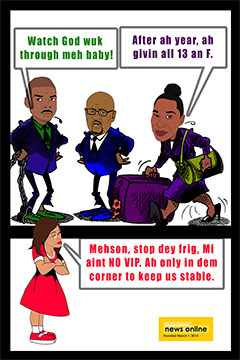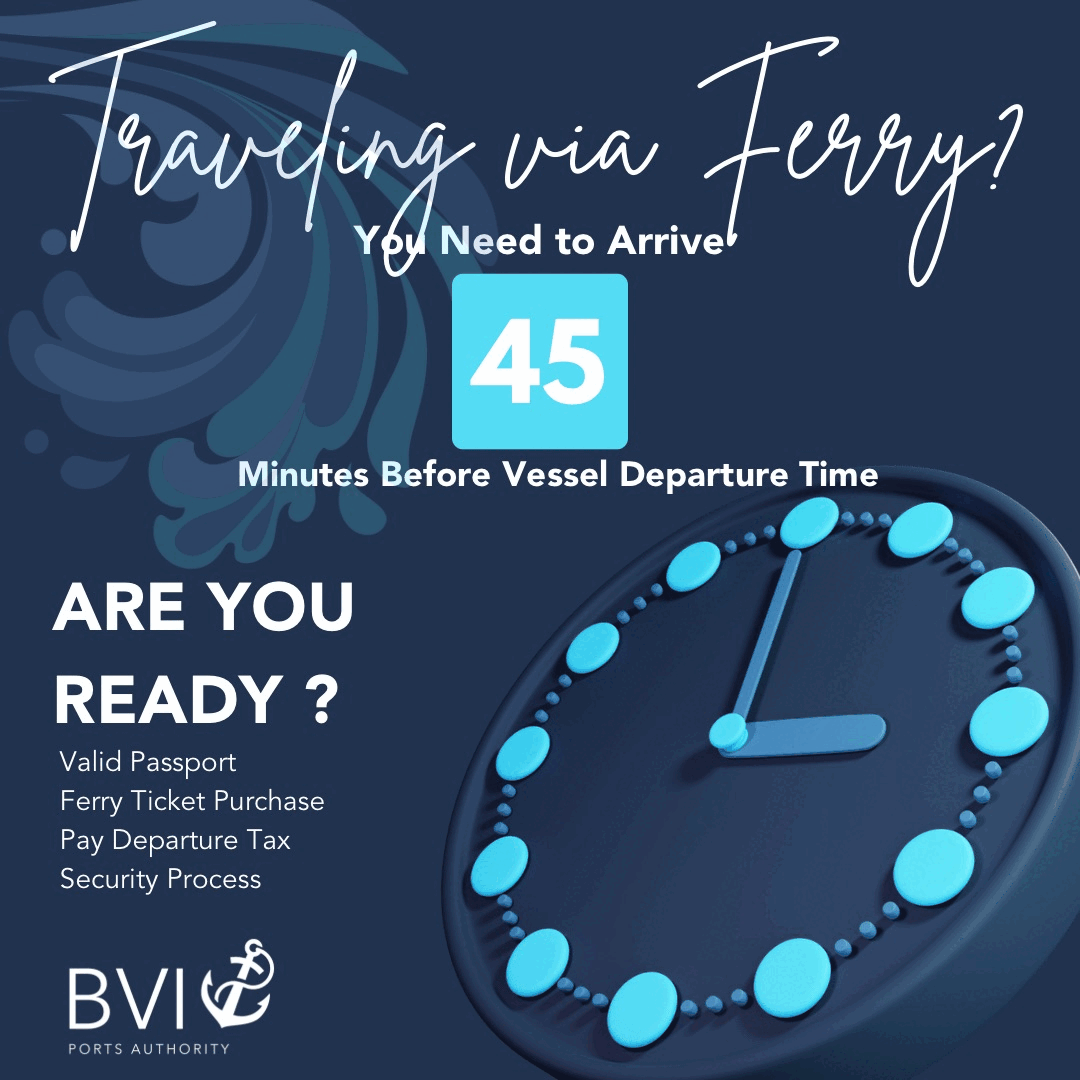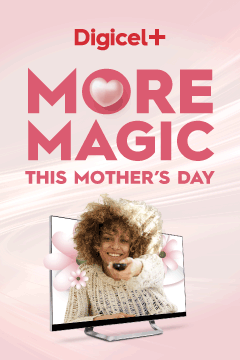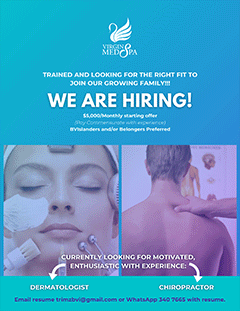Living with HIV, Tree Alexander shares his story
Tree Alexander, 25, originally from Chicago, United States, was invited to the Virgin Islands by the HIV AIDS Foundation to make presentations as a peer educator and activist.
This morning he made a brief appearance at the Elmore Stoutt High School for the World AIDS Day programme and encouraged students to pay attention to their health, get tested and protect themselves.
In an exclusive interview with Virgin Islands News Online, the vibrant young man opened up his life story of how he became infected at the age of 19, his life today five years after becoming infected, what kept him going, his focus to have an impact and help as many people as he can.
According to Alexander, he comes from a family where his parents are separated since he was three, both remarried and he has been living on his own from the age of 17.
VINO: What was your life like before you found out you are HIV positive? ALEXANDER: Before I found out I was positive I was working as a fitness instructor and personal trainer and was in an intimate relationship. I started to wonder how my partner was doing because my partner was constantly getting sick and there was always problems, and I was trying to convince her to get tested and go to the doctor but there was always excuses why not until one day my partner could not move so I end up calling the emergency care and they came and got her and they said if I wouldn’t have called that night she wouldn’t have made it through that night. They found out that she was positive and they told us that her CD 4 count was four, which means her immune system was almost non-functional and viral load was over the roof.So they started her on medication and I went and got tested but I had to wait two weeks for my results which was extremely stressful and frustrating because I had to watch her lay in the bed pretty much grasping for air, needing a diaper, needing 24/7 care while I was waiting for my results. I was wondering about my faith or how would my test result come out and what would my life look like.
VINO: What was your reaction when you got your results?ALEXANDER: I picked it up two weeks later and found out I too was positive and I didn’t know how to handle it at that time or how to react. I pretty much went into denial and a little bit of depression I refocused my entire life only unto work and I started to do more fitness classes, it went from seven a week to 16 a week, I was in the office all day, every day. I didn’t want to think what my life would look like.
VINO: How did you manage to get your life back together? ALEXANDER: It’s sad to say but I didn’t have much education on HIV then. In high school, in church or community centres didn’t teach much about it so really before I found out I didn’t think I could be affected as it was not in my community, in my life or school but in actuality it was but just wasn’t discussed. I started to go to support groups and learn how other people were affected and started to hear stories of how their family rejected them and their friends left them and that made me think of how my family would react. I got to a point where I was ready to tell my family. I told my mom and she started to cry but she needed support and called her sisters and they talked together and threw me a staying healthy party and that’s where they came together and cook what I like, and brought me information and cards and didn’t want me to be distant and let me know they loved me. It really helped to motivate me to know I had a support system.Before you know it was like a monthly cook out at my family’s house and inviting people who didn’t have a support system into my support system and that is what really fueled me to become an educator, a motivator and an activist and because everyone could not come to my home I had to create support groups in different cities and places and that is my mission is to help build community and help people reduce the stigma and the gossip and come to a place where we can talk, commune and help each other.
VINO: When did you first go public to speak about your status?
ALEXANDER: The first time I went public I was kind of scared but was only doing presentations and telling my stories outside of Chicago (home state) so I will go to DC, New York, California but didn’t tell as much in Chicago. But when I moved to New York I really opened up and start to go home and tell my story more in Chicago area. I have done work in Puerto, Africa, Canada and Europe and throughout the States.
VINO: Have you ever faced direct discrimination?ALEXANDER: I faced it in Chicago and its more about how I deal with it and react and most times I don’t blame the individual I have to hold some weight on society and we as a community develop.
VINO: How did you feel going public here in the Caribbean after hearing stories of discrimination? ALEXANDER: From the people that I have talked to so far for the past three days that I have been here, everyone is putting emphasis of how much stigma is in the area and that around HIV, pre-marital sex, homosexuality. So people are fearful to opening about their sexuality and who they are with sexually so it’s even a bigger thing when talking about HIV/AIDS.So the community has a lot of weight to how we react and some people push away for their own survival and defense mechanism. If that is the way THEY do it then it’s find I have no problem with that.
VINO: How is your health, have you ever been sick?ALEXANDER: Before I got tested I never had a cold, never had the chicken pox. After I found out I was HIV positive, I have had two colds but other than that I have been fine.
VINO: What medications are you taking? ALEXANDER: I am currently on three name brand medications, Noverr, Combivier and Reyataz. It’s a combination and been on them four years now. When I found out I was positive I was not qualified for medication as government stated I was not sick enough for medication. In the States, they were starting on medication if CD 4 counts got below 300 and mine was like 450. But when I was in New York and they started below 500, so I started.My doctor found a research study that would pay for my medication to start early before my numbers dropped so they pay for it for three years and after that I live in New York and right now I pay $2 per bottle for medicine so its three bottles per month. So I pay $6 per month. I take them every day, morning and afternoon, 8 a.m. and 8 p.m.
VINO: Do you tell people that you date of your status? ALEXANDER: When I first started dating again I started to tell people right up front and I think that was the best way to do it, I tried once to tell someone couple of weeks after we dated and it became really really stressful getting to that point, the build up to that point and finally sitting that person down and telling them that I like you and want to be with you but. I don’t like the but word so I like to tell people right up front, I am HIV positive do you have any problem with that before we go any further. Because I don’t want to waste your time and I don’t want you to waste mine.After I start to become more public, I only meet people at events and my last partner I met at a Healing Arts workshop and from there we are fine. She is HIV negative and she understands and she is right by my side.
VINO: Have you changed your life’s plans since being HIV positive?ALEXANDER: Before my life was centred on fitness and nutrition and theatre, because I love to act and dance and since I am positive I have sort of shifted that more to community development and activism and communication while bringing along the theatre side, the nutrition and fitness into it. Right now I do community activitism which is around housing, HIV/AIDs education, jobs and that’s locally and globally and I developed educational workshops and groups for men at the Brooklyn AIDS taskforce.
VINO: What advise give to the VI community regarding stigma and discrimination? ALEXANDER: As a community if we can come together and learn how to help other people a lot of times we shun those who are bi-sexuals or homo-sexuals or finding the connection in the community. And when we get into more intense things like health and HIV those are huge stigma around it but not as much around cancer when they both affect immune system, so does diabetes, high blood pressure, there will all affect the immune system and one we start to look at it as health issue and not a social issue then we can start come together as a community and grow. It is sort of a social issue but more of a health issue. People need to take care of their hygiene, fitness, nutrition etc, and once we get to that point we will be a better community.
Learn as much as you can online or ask someone about HIV/AIDS, STIs, STDS so that you can learn more for yourself then educate your peers, family and friends. For Stigma, support people, once you know the ways of transmission then you can properly protect yourself but be a support. To support someone who is HIV positive, it takes a lot mentally so always tell people to seek mental health.
VINO: What specific advice would you give to youths in the VI?ALEXANDER: In terms of testing I would encourage them to know their status which is better than not knowing, questioning your status and not knowing only adds to depression. Get tested, know your status and protect yourself. I don’t preach abstinence because I know it doesn’t exist but what I do is preach protection and to trust yourself and know that whatever actions you take have consequences, just know what you are getting into.
VINO: What impact do you hope to make in the VI by telling your story? ALEXANDER: I find myself to be a stigma warrior and the face of HIV and I hope to help to reduce the stigma and to let people know you cannot tell by looking at someone there is no scratch and sniff test you cannot say if it looks good and smell good then its good. That is not true what you can do is go and get tested and take your partner and both of you get tested at the same time.My main goal coming here was to help reduce stigma and I hope that I did that in some kind of way.








.png)

.png)



.png)

























10 Responses to “Living with HIV, Tree Alexander shares his story”